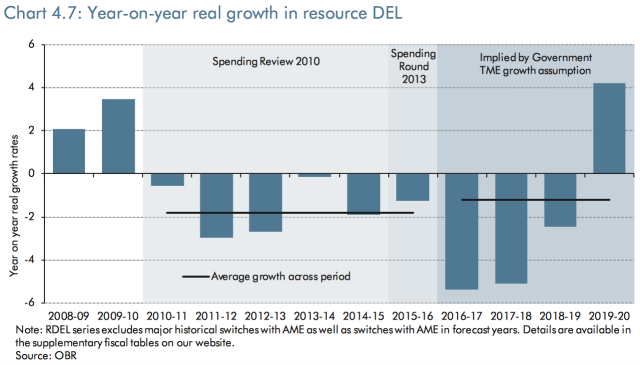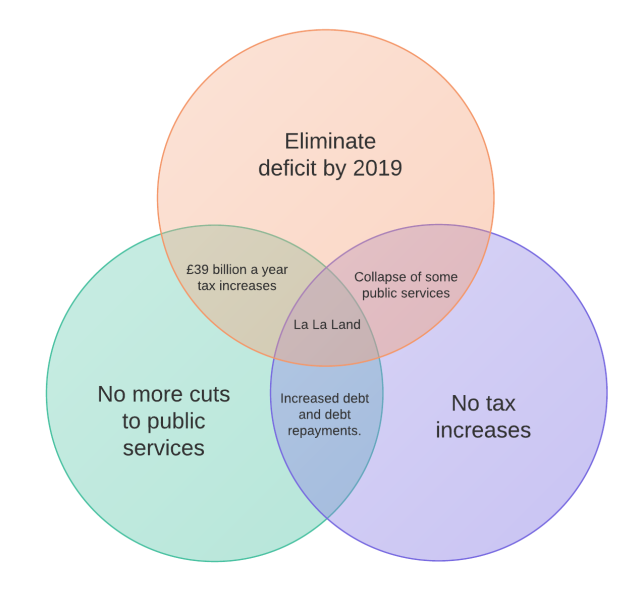Despite the usual post budget hullabaloo, the only thing remarkable about Wednesday’s announcements was just how little the overall picture has changed. As Gemma Tetlow of the IFS commented, when it comes to tax and spending the giveaways are mostly matched by the takeaways.
It’s a similar story for the wider economy. Here’s the OBR’s opening statement:
In the relatively short period since our last forecast in December, there have been a number of developments affecting prospects for the UK economy and public finances both positively and negatively. These include a further big fall in oil prices, an unexpectedly large increase in net inward migration, further falls in market interest rates, another disappointing quarter for productivity growth, downward revisions to estimates of economic growth in 2014 and downward revisions to the outlook for the world economy. These have had a relatively modest net effect on our forecasts for real GDP growth and the public finances.
Some good stuff happened and some bad stuff happened to cancel it out. Like the chancellor, the economy giveth and it taketh away. The underlying position of the public finances is pretty much unchanged.
The only major difference between this budget and the last autumn statement is the Chancellor’s decision not to go for a £23 billion surplus in the last year of the decade. Given that he only sprang that idea on us in December, reversing it doesn’t change what we already knew from this time last year. (See yesterday’s post.)
Although the government’s spending plans imply an easing off in the last year of the next parliament, the cuts needed to eliminate the deficit in 2019 are still as severe as ever. We are still looking at a reduction in public service spending of nearly £40 billion after this year and even more for those departments outside the ring-fence.
Source: Soumaya Keynes, IFS.
The squeeze would come in the middle years of the next parliament and would, says the OBR, require bigger cuts to day-to-day public service spending (Resource DEL) than anything we have seen so far.
When it comes to spending cuts, then, nothing has changed. The chancellor hasn’t eased up on austerity, he has just eased up on the additional austerity he announced in December. Eliminating the deficit by 2019 is still as big a task as it ever was. Even before the additional targets announced in December, hitting the deficit target just by cutting public services looked unlikely. As Giles said, after leaving his job with Vince Cable:
For my last few months I asked every friendly expert I could meet: do you think the figures in the latest OBR report that suggest there will be less than £300bn of RDEL spending in 2018 are credible and achievable? I never met anyone who would say yes. Mostly they looked on me as some sort of naif. I remain slightly confused at why the OBR itself doesn’t say this.
And as IFS Director Paul Johnson remarked after the 2014 budget:
It is…a Budget which leaves us with as little sense as we had before of quite how the very large public spending cuts still in the pipeline will actually be delivered.
The “rollercoaster” promise to increase spending again in the last year of the next parliament is neither here nor there. With the cuts that would be needed in the previous years, some public services would simply cease to exist by 2020. The extra spending would ease the pressure on those left standing but by then the damage will have been done.
The numbers may change slightly but the dilemma remains the same. No government will be able to eliminate the deficit without cutting public service spending or raising taxes. Either taxes go up, or government borrowing continues into the next decade, or some public services disappear. To pretend otherwise is still as much the politics of La La Land as it was last year.





“With the cuts that would be needed in the previous years, some public services would simply cease to exist by 2020. The extra spending would ease the pressure on those left standing but by then the damage would have been done.”
I don’t think there is anything wrong with some public services collapsing (or perhaps “closing” might be a better way of putting it) if we’ve been told that it will happen and had a debate about which ones should go in order to keep others working effectively and prevent tax rises. Surely better to do that than salami slice everything to the point of expensive uselessness.
The trouble at the moment is that, as you have continued to identify, our politicians are pretending that we can have it all. The budget didn’t include details of what would be cut. Perhaps the manifestos will. Wishful thinking?
Having been assured since 1946 that they can have it all , for free , the simpler British voting public would be unforgiving at the poles if any politician was silly enough to clearly state the repercussions of the 1999 – 2010 spendfest . One can hardly blame the politicians for keeping their heads down . Sad and frustrating to the point where one starts to envy the efficiency of the command economy , although only briefly !
The problem is that the real “spendfest” was the MEWing-funded consumer bonanza which chiefly benefited homeowners in South-East England, but now much poorer people in the North and the Midlands are being shafted in order to pay for it!
No no , no room for revisionism here . But please feel free to enlighten this uncomplaining midlander , MEWing ?
“MEWing” = “Mortgage Equity Withdrawal”, aka “using your house as a cash machine”.
Reblogged this on small moves big changes and commented:
Stability still remains a complicated balancing act and effective answers that meet most big agendas remain few and far between
Hardly a problem. Cutting public services means that IF the services are used, and needed, then people will pay for them directly. Losing the staff that provided the services may be problematical, although some will be transferred to service employers. Their pension will probably stay with the gov….another cost for later..Health services transfer to private admin is going to be a future problem, with many (many) hospitals now providing services for paying patients, to the detriment of those who thought they had already paid (no beds/wards are being built for paying patients, existing wards are being converted to rooms/bays for paying patients). The off-site provision of health care has now progressed to patients self-administering medication at home (and I mean injectable meds, not pills)
The cuts will not be of service, but of payment for service. Transferring the payment directly to user is effectively a tax rise, of sorts!
Exactly !
Reblogged this on Britain Isn't Eating.